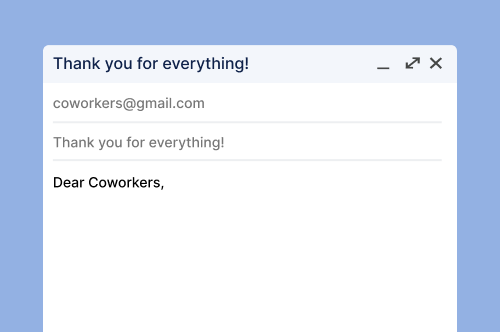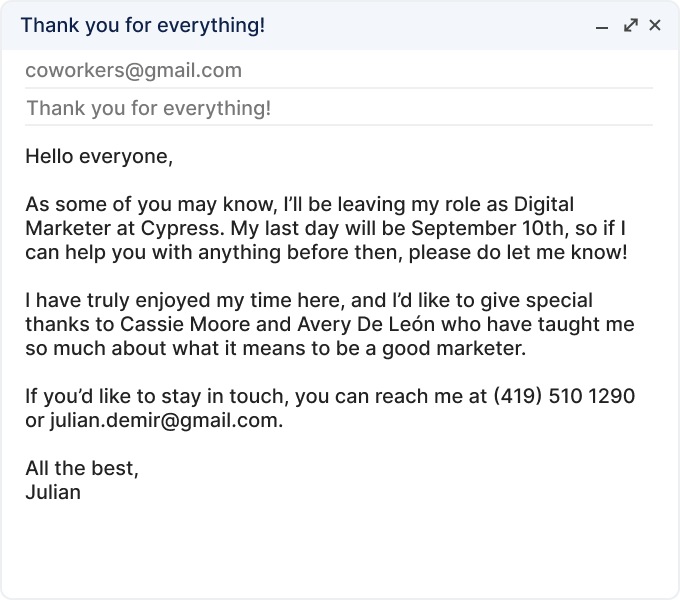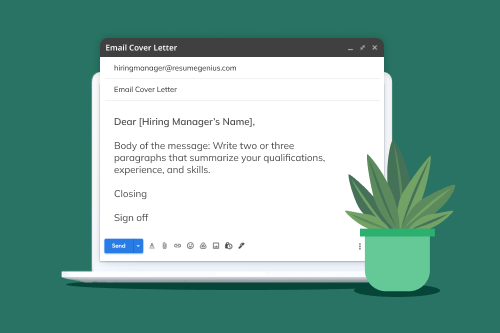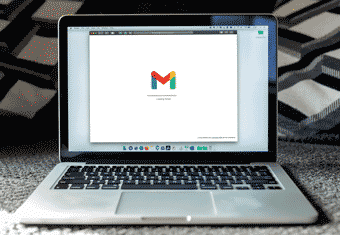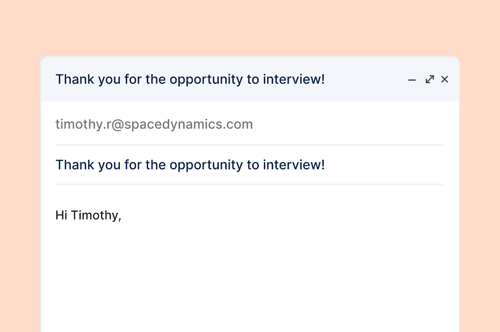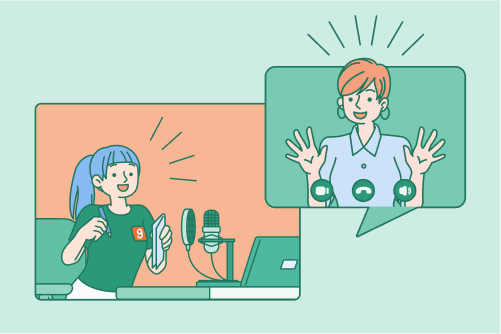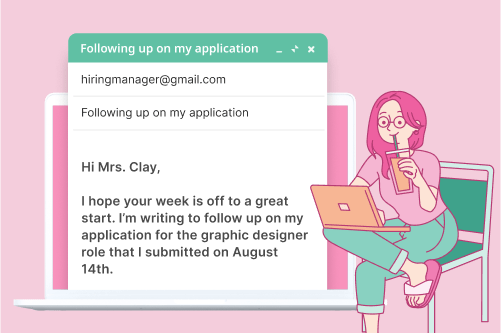After you’ve written a job acceptance letter and sent it to your new employer, it’s time to start thinking about how to say goodbye to your coworkers.
The simplest way to bid the office farewell is to write a goodbye email that mentions your plans, expresses your gratitude, and lets colleagues know how to stay in touch.
Here’s what we’ll cover in this article:
- Why you should write a goodbye email
- A farewell email example
- How to write a farewell email to your coworkers
- When to send your email
- Five situation-specific goodbye email templates
- Frequently asked questions about goodbye emails
Why write a goodbye email to your coworkers?
A well-written goodbye email is an opportunity to part ways with your coworkers respectfully, thank them for the support they’ve given you, and strengthen your professional network.
Goodbye emails are a great way to let colleagues know you’d like to stay in touch. You never know when you might need a reference or referral, so it’s important to keep those lines of communication open.
Farewell email to colleagues example
If you’re wondering what to say in a goodbye email to coworkers, you’re not the only one. Here’s an example of what a professional farewell message to colleagues looks like:
How to write a farewell email to your coworkers
When writing your goodbye email to your coworkers, you can use the following structure:
1. Mention that you’re leaving and when your last day will be
If you’re part of a team and other employees rely on you, it’s important to let them know when you’re leaving. This gives them time to prepare for your departure and resolve any final work-related matters.
They’ll probably also want to know when your last day is so that they have a chance to reach out and say goodbye before you go.
2. Briefly go over your plans for the future
If you’d like to share your plans for the future with your coworkers, remember to keep it brief. Simply provide a short explanation of what your next steps will be, especially if you’re sending your goodbye email to everyone at the company.
3. Thank your colleagues
Give a shout-out to coworkers who have been especially helpful throughout your time at the company. They’re sure to appreciate it, and if you’re sending a copy to your boss, you ensure that your colleagues’ hard work doesn’t go unnoticed.
Additionally, by acknowledging your coworkers’ efforts, they’re more likely to be willing to help you out if you need a professional favor in the future.
4. Include your contact information
Even if you’re not close with your colleagues and don’t plan on staying in touch outside of work, you should still include your contact information.
Writing down your personal email address, phone number, or a link to your LinkedIn profile in your goodbye email lets coworkers know where to find you and could lead to networking opportunities further down the line.
5. Keep a positive tone
Even if you hate your job and you’re leaving on bad terms, maintain a positive tone throughout your farewell email to your coworkers.
You don’t need to fake happiness if you were fired or never got along with your colleagues, just focus on the positive aspects of the job and your excitement for the future. You want to be careful not to burn any bridges.
When to send your farewell email to your colleagues
You should send your farewell email to your colleagues a week before your last day at work so your coworkers have time to come say goodbye to you in person.
You should always make sure your boss knows that you’re leaving before you say your goodbyes or make a new job announcement because they shouldn’t be finding out that you’re quitting through your farewell email.
Templates for your goodbye email to coworkers
To give you an idea of what a goodbye email to your coworkers should look like, here are five samples that you can copy and adjust to fit your own circumstances:
Subject: Goodbye, but not farewell
Hello everyone,
As some of you may know, I’ll be leaving my role as [job title] at [Company]. My last day will be [date], so if I can help you with anything before then, please do let me know!
I have truly enjoyed my time here, and I’d like to give special thanks to [Colleague #1] and [Colleague #2] who have taught me so much about what it means to be a good [job title].
If you’d like to stay in touch, you can reach me at [phone number] or [email address].
All the best,
[Your name]
Subject: Farewell and best wishes
Dear Team,
I wanted to let you know that I’ll be leaving [Company] on [Last Day Date]. It’s been a pleasure working alongside such talented colleagues.
As I move forward, I’m sad to say goodbye but also looking forward to [future plans]. I’m grateful for the support and camaraderie I’ve experienced at [Company]. I have learned so much about [job-specific skill or function].
A big thank you to those who’ve been exceptionally helpful, including [Colleage #1], [Colleague #2], and [Colleage #3]. Your willingness to share your experience and insights have made a lasting impact on my career.
Let’s stay connected. Feel free to reach me at [email address] or connect on LinkedIn ([LinkedIn Profile URL]).
Thank you for the memories and all the best for the future.
Best regards,
[Your Name]Subject: Saying goodbye
Dear [Team/Department Name],
I wanted to personally reach out and let you know that I will be leaving [Company] and my last day will be [Last Day Date]. I’ll be embarking on a new adventure, [brief explanation of future plans]. While I’m sad to say goodbye to [Company], I’m eagerly looking forward to this next chapter in my career.
It’s been an incredible journey working with all of you, and I’m grateful for the experiences and memories we’ve shared together.
I want to take a moment to express my heartfelt gratitude to each of you. The support, camaraderie, and collaboration I’ve experienced during my time here have truly made a difference in my professional journey. Special thanks to those who have gone above and beyond to guide and assist me, [Colleague #1, Colleague #2] – your kindness and expertise have been invaluable.
I’d love to stay connected. Please feel free to reach out to me at [email address] or connect with me on LinkedIn ([LinkedIn Profile URL]).
Thank you for being a fantastic team to work with. I’ll miss our daily interactions but am excited to see the great things you’ll accomplish at [Company].
Wishing you all the best!
Warm regards,
[Your Name]Subject: Transitioning with gratitude
Dear [Boss’ name],
As we discussed, I’ll be leaving [Company] on [date].
I’d like to thank you for all your help and guidance during my time here. I’m very grateful for your support and all that you have done to help me grow in the role of [job title].
While I’m sad to be leaving, I look forward to applying what you’ve taught me in my new role as [job title].
Please feel free to reach out to me at [email address] or [LinkedIn] at any time, I’d love to stay in touch!
Best wishes,
[Your name]
Subject: Farewell and appreciation
Hi all,
As I’m leaving my position as [job title] on [date], I wanted to take the opportunity to thank all of you for your hard work over the past few years.
It’s been a pleasure working with you, and I couldn’t have asked for a better team. Thanks to you, we’ve been able to achieve [accomplishment].
I wish you the best of luck in the future, and if you ever need advice or a recommendation, you can contact me at [email address] or [LinkedIn]. I’d be more than happy to help out!
Thanks again,
[Your name]Frequently asked questions about goodbye emails
Need a bit more help? Check out these answers to common questions about goodbye emails.
How do you say goodbye in an email professionally?
Here’s how to say goodbye in an email professionally:
- Strike a balance between formality and warmth
- Start by informing colleagues of your departure and specifying your last day
- Keep the message concise while expressing gratitude for the experiences and relationships you formed
- Share brief insights about your future plans
- Conclude by providing your contact details
Here are a few things to avoid to keep your email professional:
- Any negative comments about the company (or coworkers) you’re leaving
- Oversharing about why you’re leaving or the perks at your awesome new job
What is a good subject for a goodbye email?
Here are some good subject lines for your goodbye email:
- Farewell and thank you
- Goodbye with gratitude
- Saying thanks and goodbye
- Onward with appreciation
- Best wishes and goodbye
- Cheers to new adventures
- Endings and beginnings
- Heartfelt farewell
- Wishing you a fond farewell
- Saying goodbye, staying connected
How do you say goodbye on the last day of work?
On your last day of work, take the opportunity for face-to-face interactions.
Now’s your chance to express gratitude to colleagues and supervisors for their support and guidance and exchange contact information with those you want to stay connected with.
If you want to send a last day of work message, here’s an excellent example you can send to your colleagues:
Hello Everyone,
Today marks the end of an incredible journey here at [Company]. As I move on, I wanted to take a moment to express my deep gratitude for the amazing experiences and friendships I’ve gained during my time here.
I feel fortunate to have been a part of such a talented and supportive team. The memories we’ve created and the challenges we’ve overcome together will stay with me as I step into this new chapter. While I’ll miss our day-to-day interactions, I’m excited about the opportunities that lie ahead.
Please stay in touch! You can reach me at [email address] or connect with me on LinkedIn ([LinkedIn Profile URL]). Let’s keep the lines of communication open and continue to support each other in our respective journeys.
Thank you again for everything, and I wish each and every one of you nothing but success, growth, and happiness in the future.
Warm regards,
[Your Name]

Corissa Peterson, CPRW
Career Advisor & Senior Content Writer (CPRW)
A dedicated member of the Resume Genius team with a passion for the career space, Corissa is always looking for ways to create useful resources for job seekers, from writing job-specific resume samples to crafting in-depth articles on how to ace interviews. Corissa graduated from the University of Colorado at Boulder with a B.A. in Philosophy and a certificate in Peace and Conflict Studies. Corissa’s articles have been published on Diversity Jobs, Recruiter.com, Teachstone, and Jobillico, among others, and her career advice has been featured in Bloomberg Businessweek, GOBankingRates, and UpJourney. You can connect with her on LinkedIn.
View Corissa's ProfileClick to rate this article
4.1 Average rating


